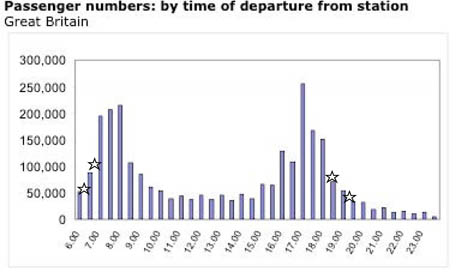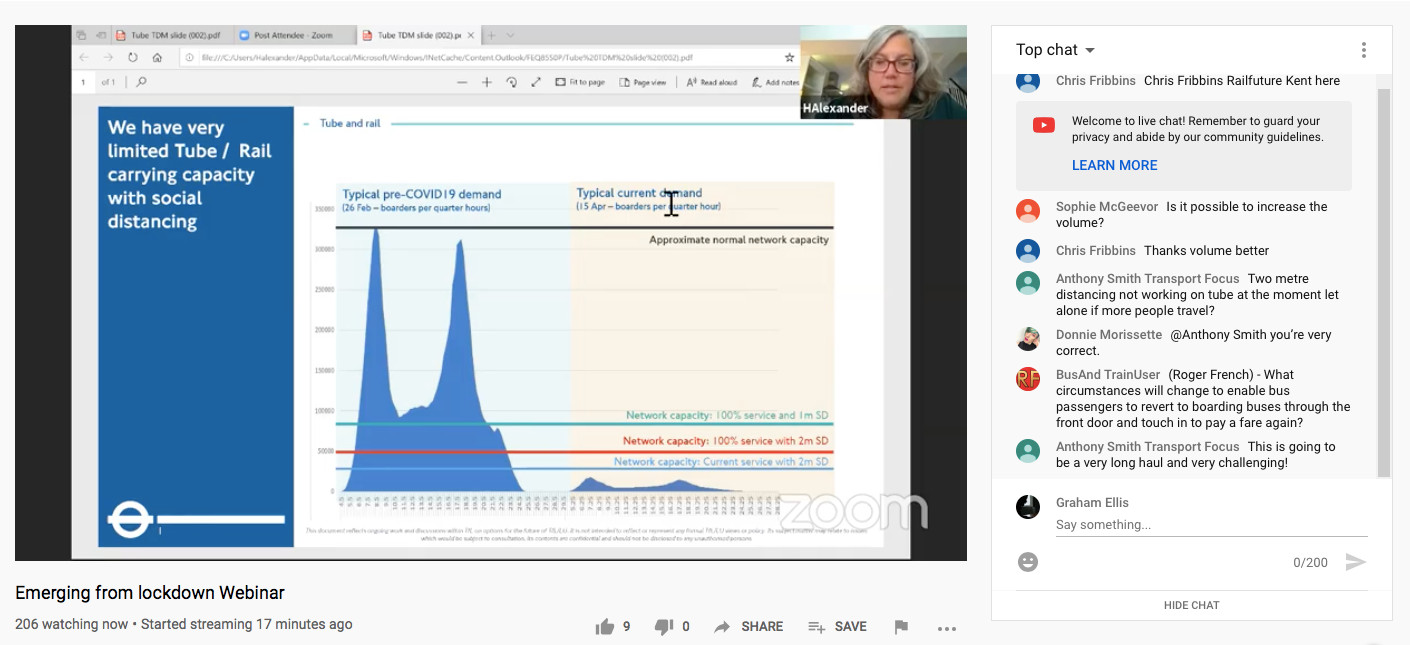"How many people use [Westbury] Station each day?" - a question to me a few days back by the team looking at their next neighbourhood plan, investigating
the possibility / practicality of a bus service to the station, where a bus (at present normal) only calls four time per a day, and that's on a rural route rather than anything the serves the town and its residential areas.
My questioner tells of asking the major train operator at the station ... who referred him to National Rail ... who referred him to Network Rail ... who referred him back to the major train operator at the station. "Surely someone has this data" muses my questioner. And adds "and which of them is responsible for buses to the station", where questions to various organisations have been met by "not us, Guv" answers.
Excellent questions, though.
The correct start for looking at the aspiration of "bus to the station" includes, but is not limited to studying "what is there now and how is it used" ... and I have started by playing with data and personal knowledge to estimate numbers. My data is mostly from rail sources - other data from town sources would be welcomePassengers using Westbury StationSource of numbers - try the Office of Rail and Road which is an offshoot of the Department for Transport who publish annual ticketed journey estimates for every station. Data at
https://dataportal.orr.gov.uk/statistics/usage/estimates-of-station-usage . I have formatted data for Westbury and the next station in each direction at
http://www.passenger.chat/WSBTROPEWDMHFRO.html from the
ORR» data. You can see the time series including past years at
(Westbury - next trains).html" target="_blank">http://www.passenger.chat/smr/WSB.html (which also gives fare lookup and real time train running links. Note that the ORR is based on ticket sales and will not include staff travel or ticketless travel which (in patches) is a significant problem.
- Also ask about Lennon, Moira and Orcats data from industry sources. These may well be commercial in confidence and on restricted circulation - however data is there about the most sold journeys if you want to know where people go. Time of day data may be present in some but not all of these stats.
- Also ask your local transport authority (Wiltshire Council) and Community Rail Partnerships (Severnside, Heart of Wessex and TransWilts) if they have any survey data. This may provide other vital data such as how people got to the station and where their "final mile" origin is, time of day travelled, purpose of journey, etc, which will help inform your analysis of potential bus rides, but based on present journeys and NOT potential ones by people who whom getting to the station is so difficult they don't do it.
OK - so you have the raw annual numbers.
How are the journeys spread out through the day and weekA corollary question ... 548720 ticketed passengers in a year is not 1500 every day, and certainly not 62 every hour of whom 31 arrive and 31 leave.
Splitting this down with the data I have at hand comes with a strong element of educated guesses based on other data, bearing in mind that Westbury, while it is (of course) unique has similar lifestyle patterns to other towns. To inform my understanding:
i. Westbury has some tourist draws which may be seasonal. I believe there's a White Horse, a Victorian Swimming Pool, listed buildings, a priory, a country park and it's a trainspotter's Mecca. However, personal observation suggest that such seasonal traffic is only a tiny proportion of the traffic and if we work out our numbers based on splitting 550,000 into 50 weeks - 11,000 journeys per week, we won't be far out. The two extra weeks allow for lower numbers from 21st December to 7th January / the Christmas fortnight and also Easter and other Bank Holiday traffic drops. 11,000 ain't going to be far out for a typical week.
ii. Most traffic is commuter, but there is substantial weekend leisure traffic. Fridays and (to a lesser extent) Mondays are a bit quieter than middle of the week days now - so let's divide the 11,000 into 15% on Monday, 16% on each of Tuesday to Thursday, 14% on Friday, 12% on Saturday and 11% on Sunday. Even if I'm a bit out with those numbers , they're unlikely to be more than 1% out. This is certainly not like the 23:20 Bath to Melksham bus with less than 10 people on a Tuesday and 60 on a Summer Friday or Saturday. So that gives us 1760 ticketed journeys on a typical midweek day
iii. Under normal circumstances, I would expect arriving numbers and departing numbers in a day to be roughly the same - especially during the week. So that's 880 arrivals and 880 departures.
iv. How are passengers spread through the day. Two graphics to help us:
 Very old, but gives an idea
Very old, but gives an idea Current, but Transport for London rather than Network Rail
Current, but Transport for London rather than Network RailBoth graphics are showing passenger numbers during peak times at about three times the level of passenger numbers between the peaks. How wide the peaks are, and how long the evening "tail" is, will make a significant difference to the answer to the ultimate questions of "how many people enter Westbury station each hour" and "how many people exit Westbury station each hour". Here is my guess from the graphic and observation (hourly, starting 06:00 to 07:00):
8x + 15x + 12x + 8x + 6x + 4x + 4x + 4x + 4x + 7x + 8x + 12x + 15x + 8x + 4x + 3x + 4x
(where x takes the value 14). Now guestimating those into departing and arriving passengers
7x + 13x + 11x + 6x + 4x + 3x + 3x + 2x + 2x + 2x + 2x + 2x + 2x + 2x + 1x + 0x + 1x - station entrances
1x + 2x + 1x + 2x + 2x + 1x + 1x + 2x + 2x + 5x + 6x + 10x +13x + 6x + 3x + 3x + 3x - station exits
which works out at 182 passengers in each direction in the busiest hour; do note that with many hours there will be changes across the hour - for example fewer returnees between 17:00 and 17:30 than 17:30 to 18:00
How are those people getting to the station?Westbury Station Car Park has 420 spaces; expanded recently and said to be full already after the morning peak. It is, however, very sparse overnight. Of the 518 people entering the station before 10 a.m. on my estimate, it would be not unreasonable to suggest that two thirds (342) might be car divers parking for the day. Which leaves 176 (of whom 61 are in the busiest hour NOT driving themselves to the station. Lets play a bit more with that.
In the busiest hour (7 to 8 a.m.), perhaps
120 drive themselves to the station
20 walk
15 get a lift to the station (2nd person in parking car)
8 are dropped off
7 arrive at the station on a bicycle
4 arrive at the station by taxi
2 arrive at the road end by bus
APCOA▸ may well have data on the pattern of cars arriving at and leaving the car park
Where are they coming fromThis is where you really need a survey to find out. Impractical at the moment - not only with distancing rules, but also with changed travel patterns.
There are general catchment rules - walking within x kms and cycling with y kms - or something more sophisticated as you'll see at
https://www.witpress.com/Secure/elibrary/papers/UT08/UT08017FU1.pdf . Where circles from two stations overlap, you may have an extra complication - and Dilton Marsh and Westbury stations have overlapping catchments. Because services at Dilton Marsh are awful compared to those at Westbury and all Dilton Marsh services also call at Westbury, the effect of the overlap on Westbury is minimal.
Data may be available from Wiltshire Council (sustainable transport) and the Community Rail Partnerships from their surveys if any, but may be not down to the last two letters of the postcode. I would be pretty sure that work was done before the recent extension or car parking at Westbury station to find out where people were driving from and where they might want to drive from. The White Horse News on 9th April last year carried a picture of the extension being opened - "Back row l-r: Robert Brown – Friends of Westbury Station, James Wilcox – GWR, Byrony Chetwode – TravelWatch SouthWest, Dan Okey – GWR, Ian Awcock – Awcock Ward Partnership, Simon Gledhill – GWR, Tom Vaughan-Jones – Square Bay, Stephen Shaw from Alium Group. Front row l-r: Rosemary Buchan – Friends of Westbury Station, Matthew Golton – GWR, Cllr Horace Prickett – Wiltshire Council, Paul Johnson – TransWilts Community Rail Partnership, Andrew Payne – Allium Group." and there are some of that group who's teams / staff will have known a lot more about the effect of extending the car park before they signed off on it.
Who is responsible for buses?Businesses ("Bus Companies") can run bus services where and when they wish, registered / changed with the Transport Commissioner at 70 days notice. Lots of rules and regulations on safety. Although described as commercial, services can claim support through
BSOG▸ -
https://www.gov.uk/government/collections/bus-services-grants-and-funding , and are required to accept
ENCTS▸ cards if their services carry local passengers for which they get payments designed to cover costs through the local transport authority - see
https://en.wikipedia.org/wiki/English_National_Concessionary_Travel_Scheme .
Once commercial services are 'set', the
LTA▸ works out what else they feel is socially necessary in addition, and
can buy in additional services. Rules are that they must not compete with commercial services.
There is a recent requirement to provide open bus data. No requirement on common timetables or ticketing - in fact commercial competition is encouraged. Personal view is that competition often works against a planned, stable network, especially away from major urban flows.
There is no primary business requirement on anyone to provide buses to stations, though there are schemes to encourage it.
Separate study / writeup on "buses to stations - the metrics" to follow?What for the futureGrowth of Westbury
- more houses
- more businesses
- more leisure attractions
Changes in train services / Aspirations
- London every hour rather than every 2 hour
- MetroWest from Bristol - up to 2 per hour
- Much improved to Frome, Yeovil and Weymouth
- Hourly to Swindon
- Hourly local to Southampton
Wider changes
- movement towards working from home
- current movement from public to private transport
- future movement to public not private transport
- movement to shift work and staggered travel
- switch from franchise to other model
- how will buses be specified / financed
What do you want a bus to the station to do, and how do you think it should be achieved??This is "Chapter 2". All the stuff above is Chapter 1 - setting out the current status and looking forward to changes which are on the horizon and set the environment under which any buses would run





